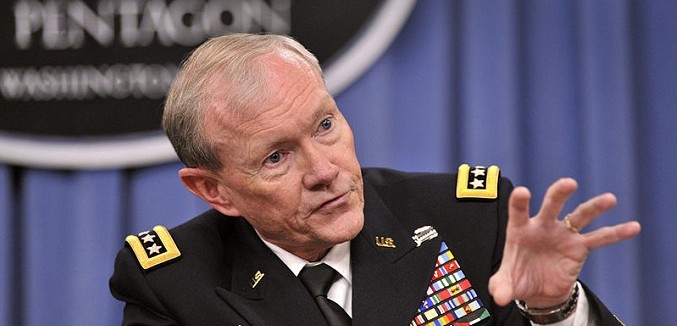Chairman of the Joint Chiefs of Staff General Martin Dempsey slammed Iran yesterday as “a threat to U.S. national security,” emphasizing that the Islamic republic is “certainly preserving and building on [its] options” for creating a nuclear weapon.
“Iran is a threat to US national security in many ways, not simply their move towards the potential to develop a nuclear weapon,” General Martin Dempsey, Chairman of the Joint Chiefs of Staff, said during a Congressional hearing yesterday.
“I choose my words carefully, because the intelligence community has not yet come to a conclusion that they intend to build a nuclear weapon, but they’re certainly preserving and building on their options to do so, which should be of concern to all of us and is,” he said in response to a question.
“We have been very clear as a nation that we are determined to prevent them from acquiring a nuclear weapon because it would be so destabilising to the region. But they are also active in cyber. They’ve got surrogates all over the region and all over the world. They proliferate arms. They are a disruptive influence globally. And so I do consider them a threat to our national security,” Dempsey said.
Meanwhile Israeli officials disclosed analysis suggesting that Iran is developing the infrastructure, colleting the materials, and assembling the know-how to build dozens of bombs every year.
Iran is working round the clock to enlarge its nuclear infrastructure with the eventual aim of developing an industry capable of building up to 30 bombs a year, an Israeli minister charged on Monday.
Speaking to reporters in Jerusalem, Intelligence Minister Yuval Steinitz said Tehran was “very close” to crossing the red line laid out by Israeli Prime Minister Benjamin Netanyahu last year.
But he said it was biding its time and building uranium-enrichment facilities before making the final push for weapons-grade material.
The regime is widely believed to be pursuing two distinct tracks for developing a nuclear weapon. It is systematically locking in critical infrastructure that will permit Iranian scientists to build a uranium-based bomb as soon as a political decision is made to do so. The advanced IR-2m centrifuges that Iran has been installing in its Natanz facility will allow Tehran to enrich uranium at a pace orders of magnitude faster than it could with previously installed technology, and analysts are concerned that the capability will allow Iran to sprint across the nuclear finish line before Western powers can detect the move and intervene.
Iranian officials also revealed this week that they have made major strides in bringing online the plutonium reactor at the country’s Arak facility. Once activated, the reactor will put Iran in a position to pursue a plutonium-based nuclear weapon of the kind repeatedly detonated by North Korea.
[Photo: Slick-o-bot / Wiki Commons]




